Environment Justice Matters Vol. 4 Issue 04

Vol 4. Issue 04
ESG Features
Workshop held at the Kochi-Muziris Biennale

ESG and Art By Children initiative of Kochi-Muziris Biennale 2022 organised interactive, informative, introspective and insightful workshops to help build wellsprings of collective imaginaries and hope, to triumph over disempowering anxieties of prevailing climate crises. Read the report here.
Global Webinar Series on Tackling Air Pollution

With air quality worsening across India, ESG has initiated a series of webinars drawing upon the expertise of an interdisciplinary panel of leading experts and decision makers from across the world in a series on Tackling Air Pollution. The first of the four-part webinar series was organised on March 8th, International Women’s Day, focusing on Role of Science, Public Health, and Governance in Tackling Air Pollution. Read the report here.
The next webinar will be held on 6th April, 2023. Register to participate.
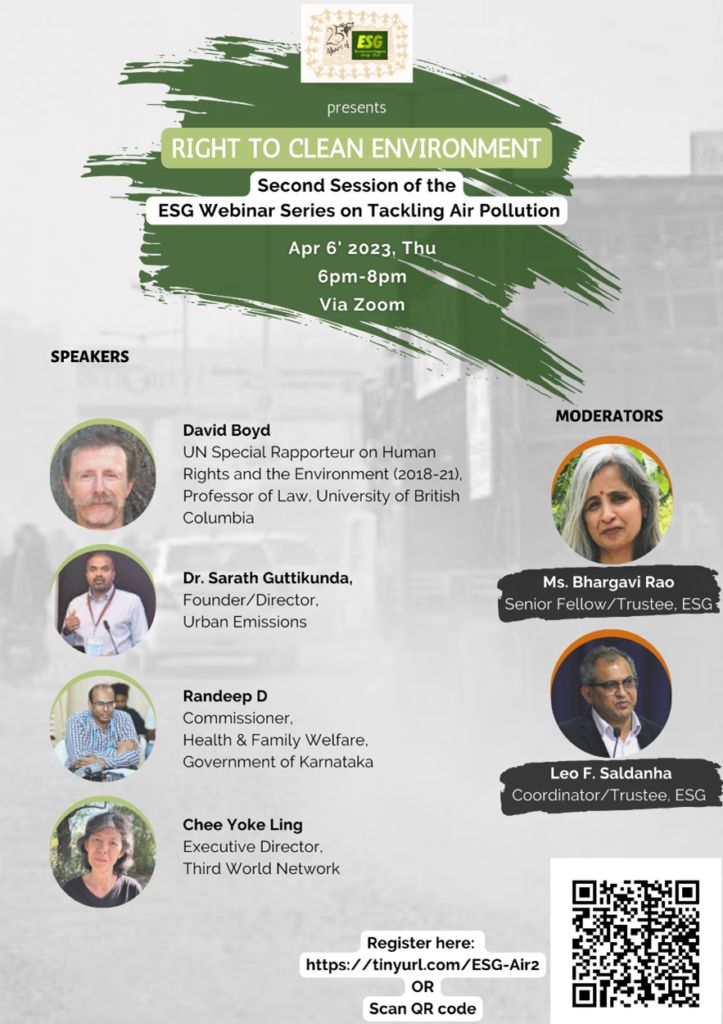

ESG at the United Nations Human Rights Council
Leo Saldanha of ESG was invited to speak in a side-event of 52nd session of the Human Rights Council, United Nations on “Realising the Right to Housing in the Climate Crisis” which was held on 9th March, 2023. Mr. Balakrishnan Rajagopal, Special Rapporteur on the Right to Adequate Housing, prepared a report on the topic. The discussion can be viewed here.

Speaking to the august forum, Leo Saldanha emphasised the critical importance of protecting housing of the poor, farmers and pastoralist, fishers and adivasis (indigenous people) who are extensively threatened with displacement and dislocation by draconian laws and policies. He highlighted how city expansion, infrastructure development, tourism (such as on Loktak Lake), even national security and solar parks, are all reasons for displacing and making millions homeless across India. Despite progressive Housing Rights judgments, reading of the Right to Housing as a part of Fundamental Rights, and the enactment of Forest Rights Act, 2006 and the Right to Fair Compensation and Transparency in Land Acquisition, Rehabilitation and Resettlement Act, 2013, clever ways are employed to displace rural communities without extending them benefits of these laws, as was recently, and brutally discovered by 17 villages north of Bangalore, displaced to create the Dr. Shivarama Karanth Layout. As space for democratic participation is shrinking, and the role of civil society marginalised, the impacts on the poor and working classes are worsening and the Right to Housing is really not reaching those most in need, he submitted to the United Nations Council.
Ecologically Sensitive Regions Threatened

Environmentalists say that the upcoming IT Hub over the ecologically sensitive and protected mangroves of Mumbai, including the 289-hectare intertidal Panje wetland which is also supposed to be a holding pond as a flood mitigation measure, is a recipe for disaster and is contrary to the law that mandates all mangroves be handed over to the forest department.

At the same time, the expansion of salt mining in the little Rann of Kutch has been brought to the attention of Gujarat High Court in a PIL highlighting that the activity is recklessly expanding into the notified sanctuary, which is home to the vulnerable Asiatic Wild Ass.
Regulatory Collapse meets Reckless Development
More evidence is surfacing of the collusion between regulatory agencies and investors keen on making billions out of the proposed to transform Nicobar Island into a Urban-Industrial-Infrastructure hub, with clear evidence of the Union Ministry of Environment, Forests and Climate Change turning the environmental clearance mechanism into a ritual – with Environmental Impact Assessments (EIA) being prepared way before the Terms of Reference (TOR) are even developed – to push through environmental clearance, and thus pave way for a Free Trade Zone whilst keeping local communities totally in the blind. The looming question is for whose benefit is this devastation proposed?
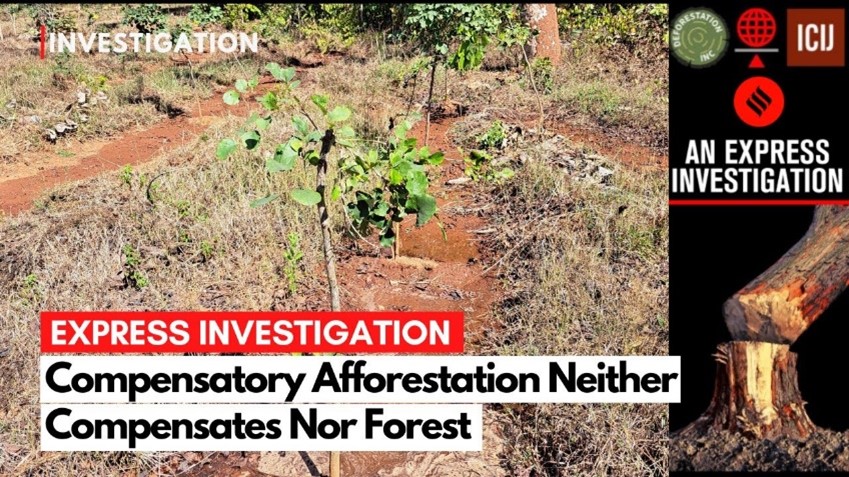
While there is global alarm that the potential loss of forests and coastal ecosystems in Nicobar would be compensated by planting trees in Haryana, Indian Express investigations reveal that massive financial reserves collected for compensatory afforestation is lying unused: out of Rs. 66,000 crores available, Rs. 55,000 crores lies unused. Raising questions, on the one hand, if ever the money for reforesting Haryana for loss of Nicobar forests will ever be actualised. Then, of course, is the widespread concern that such afforestation exercises are essentially creating industrial monocultures and do not in any way compensate the loss of rich rainforests.
Devastating and Draconian Urbanisation
The regulatory collusion between Karnataka State Environment Impact Assessment Authority and Bangalore Development Authority (BDA) is also at the base of a massive expansion of housing layouts to the north of Bengaluru metropolis. Armed with a controversial order of the Supreme Court that land for this 3,546 acres urban development project can be acquired in 17 villages on the basis of the colonial and draconian Land Acquisition Act, 1894, BDA and the police have launched a brutal demolition of farming properties and reckless destruction of farmland for the proposed Dr. Shivaram Karanth Layout. No one in the 17 villages has been compensated, rehabilitated or resettled as it is needed per the Right to Fair Compensation and Transparency in Land Acquisition, Rehabilitation and Resettlement Act, 2013. The Supreme Court’s decision to rely on the colonial 1894 law also comes at a time when another decision from the Supreme Court by a three judge Bench, held that land acquisition must only be undertaken per the 2013 Act. The Karnataka High Court has also recently likened the BDA’s mindset to that of the East India Company.
Farmers have been running from pillar to post to access justice, and every forum appears to be shutting doors on them. Leaving thousands of farmers homeless and destitute and destroying the protected region’s rich biodiversity. The Dalit Sangharsha Samithi (Coordination) and ESG have written an Appeal to Karnataka Chief Minister to issue an Ordinance to Save Farmers and Dalits impacted by SK Layout from Atrocious Injustice. Download the petition here.
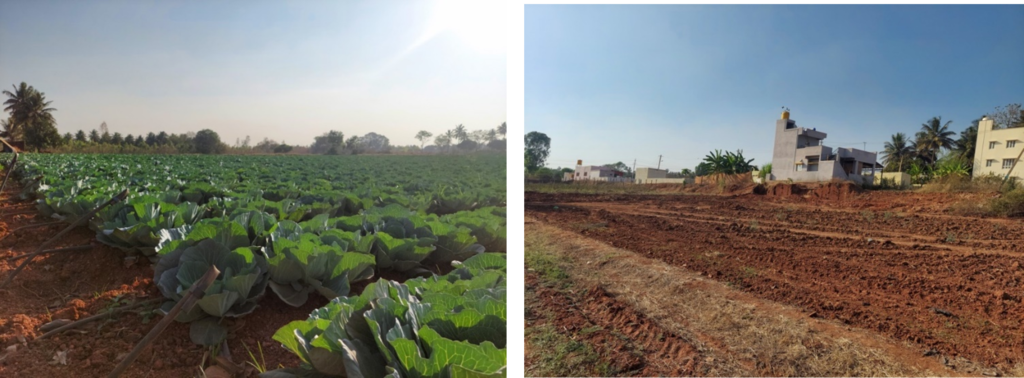
Are Renewables Sustainable, and Climate Friendly?
Floating solar panels are being used in over a dozen countries as an alternative to greenfield development of solar parks, as in Pavagada, Karnataka which is associated with massive and adverse environmental and social impacts. But this growing solution of floating panels on the water could also be problematic, experts say. For solar-resource-rich regions, roof-top installations could be a way forward. Meanwhile, global solar energy generation is said to overtake other energy sources by 2027.
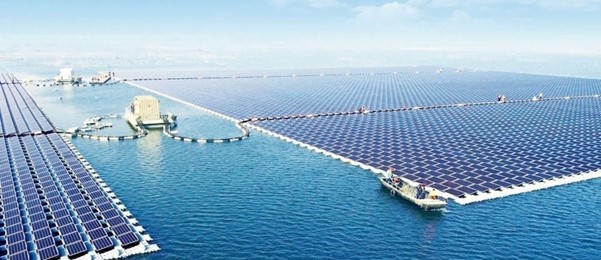

Mega dams are also being termed sustainable and climate friendly, as is the case with a Rs. 319 billion mega dam to generated 2,880 MW electricity across Dibang River of Arunachal Pradesh, a tributary of the mighty Brahmaputra, that will destroy tens of thousands of acres of pristine forests. The Indian Power Ministry is also promoting massive dilution of environmental and financial regulatory standards to push forward with such schemes. Particularly for pump storage capacity projects, the need for local public consent and Environmental Impact Assessment Study is also sought to be done away with, which Himanshu Thakker of SANDRP says could lead to catastrophic incidents such as Joshimath.
But this is not stopping the Indian Environment Minister from claiming that “India’s climate policy is directed towards sustainable development and poverty eradication, while striving continuously to decouple emissions from growth and achieve energy efficiency across sectors.”, speaking as he was at the recent Raisina Dialogue.
Plastics now in the air


Photograph: Dpa Picture Alliance/Alamy
While there is growing concern of the spread of microplastics with a study estimating 170 trillion plastic particles afloat in the world’s oceans , in fish, even in our bodies, studies now reveal that microplastics are also in the air. And that it can potentially alter temperature and rainfall patterns. And there is a growing pitch made for “biodegradable plastic” as a good alternative, when it is increasingly clear that it only adds to the growing plastic problem. Worryingly, a new disease due to plastics called platocisis is afflicting seabirds as plastic particles are rupturing their digestive tracts.
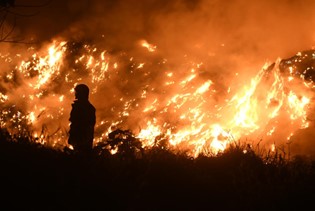
The Brahmapuram Dumpyard Fire in Kochi remains uncontained since 1st March. Similar incidents have happened in the past, but since there is no learning from such disasters, they keep recurring. For impacted populations, the huge intake of dioxins and other colourless, odourless substances emitted from such fires, chemicals which stay in the air for over 10 years, have devastating health impacts.Which the Kerala High Court says is likened to being ‘trapped in a gas chamber‘.
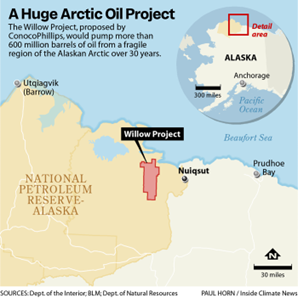
The Indian Environment Minister has recently admitted that over 11,000 billion tonnes of waste is accumulated in India and there is a need to immediately move towards a circular economy. But such rhetorical commitments are not followed by critical action, as is discussed in the special programme by India Today terming the situation an Air-mergency.
Meanwhile, the push for petrochemicals continues incessantly with the USA pushing forward oil mining with Alaska’s Willow Project: the impacted region will cover an area roughly the size of Bihar. This would result in the release of 263 million tons of greenhouse gases, roughly equal to the combined emissions from 1.7 million million passenger cars over the project’s 30 year life.
Climate Change is Happening Now

India has witnessed 42,799 forest fires in the first two weeks of March this year, a 115% increase compared with the same period last year. Wildfires are raging across Goa, and the Navy and Air Force have been called in to help. But this situation was predicted many years ago, even as there are concerns some of these fires are the outcome of foul play.
Such extreme weather conditions cost the economy dearly and it is estimated that Germany could lose up to 900 billion Euros due mid-century due to adverse Climate change impacts. Chennai and Kolkata are at high risk in India due to rising sea levels, but there appears to be little or no proactive action to prepare for this impending catastrophe.
The good news is that the world has converged on a historic High Seas treaty to protect biodiversity and tackle over extraction and biolooting of the seas due to prevailing unregulated fishing and mining activities.
ESG Updates
Public Interest Litigation: ESG’s PIL (WP 46523/2012) on solid waste management was heard by the Division Bench headed by the Chief Justice of the High Court of Karnataka on 13th March, 2023. The Court directed Respondents (State, BBMP & KSPCB), to file a status report on their compliance with earlier orders.
On 14th March, 2023, the PIL regarding protection and rehabilitation of lakes and raja kaluves (WP 38401/2014 and GR Mohan PIL), in which ESG and Leo Saldanha are parties, was heard at length by the Division Bench of High Court of Karnataka. The particular issue in focus was encroachments in Mallathahalli Lake and Mathikere Lake during the recent Shivaratri festival. The High Court directed no individual, politician or association be allowed to conduct any activity or construction on the lakebed, and further that the ‘kalyani’ already constructed inside the lake can only be used for immersion of Ganesha and Durga idols.
Another issue currently pending consideration in this PIL is that of the rejuvenation of Subramanyapura Lake. ESG’s decades long efforts saving this lake, which is a candidate for the efforts involved in saving all lakes, was featured by Indian Express.
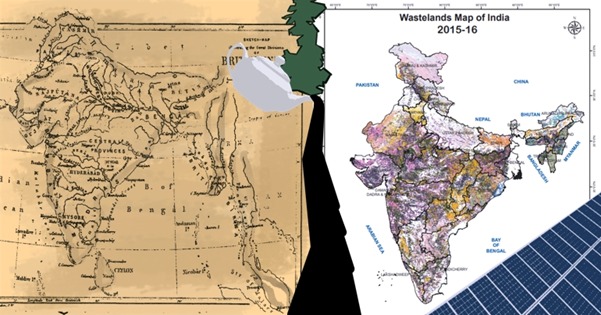
The Canary in a five part investigation (Part 1, Part 2, Part 3 and Part 4) into how UK government climate finance is aiding land grab in the name of solar park development, featured ESG’s efforts questioning governments and corporates who are reproducing the
extractive nature of fossil fuel development in the promotion of renewable energy. In the fifth and final part of the series, Leo Saldanha explains how colonial-era laws and tactics are being used to displace agro-pastoral communities by terming Grasslands and landscapes on which agro-pastoral communities rely on for livelihoods, as “wastelands”, thus making it easy to divert massive tracts of land for mega solar parks. He explains how neo-colonialism in the guise of climate protection is pushing forth into rural landscapes across India, in which United Kingdom financed projects are mimicking patterns of development reminiscent of East India Company’s ways. Besides, most of these plants are built with panels imported from China, which he termed as “blood panels”.
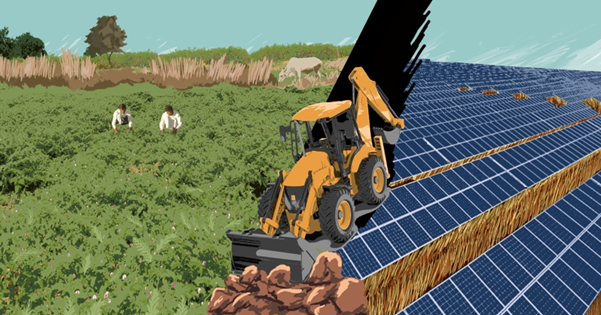
On the occasion of Women’s day, Suprabha Seshan, Trustee at ESG, was featured as a ‘Climate Heroine’. Suprabha speaks on the importance of respecting traditional and indigenous peoples from rainforest areas through cooperation and mutual support, as well as of the need to educate young students and forest activists on issues of ecological destruction and renewal.
Recalling ESG’s efforts in ensuring all urban commons are inclusive and accessible to all at all times,Leo Saldanha speaks to Deccan Herald on how ungraceful fencing of MN Krishna Rao Park has entirely destroyed this historic park.
Last, but certainly not least:
Washington Post reporting on the Intergovernmental Panel on Climate Change latest report says World is on brink of catastrophic warming. But the U.N. climate change report says Urgent climate action, really serious action in the next 10 years, can still secure a liveable future for all, and we just might still be able to stave off the catastrophe. Read the IPCC’s Sixth Assessment Report presented during the Panel’s 58th Session held in Interlaken, Switzerland held during 13 – 19 March 2023.
Environment Support Group (Trust)
1572, 36th Cross, Ring Road , Banashankari II Stage
Bangalore 560070. INDIA
Tel: 91-80-26713560 | Voice/Fax: 91-80-26713316
Website: esgindia.org Email: socialmedia@esgindia.org
Follow our Facebook, Instagram, Linkedin and Twitter page
- ESG is registered to secure support under the Corporate Social Responsibility (CSR) scheme of the Ministry of Corporate Affairs. Reg No. -CSR00017320
- Environment Support Group (ESG) is eligible to receive foreign donations/grants per the Foreign Contribution Regulation Act (FCRA)
- All donations to ESG from Indians are eligible for tax exemptions as per Sec. 80G of the Income Tax Act.
More details about ESG’s Financial Reports and Statutory Approvals are accessible here: https://esgindia.org/new/financials-and-statutory-clearances/
Your Monetary Contributions Keep Us Working

Donate Via UPI
(This QR Code is applicable ONLY to Indian/Domestic donors. Post UPI payment, please share donation details to [email protected] along with PAN – statutory requirement.)

